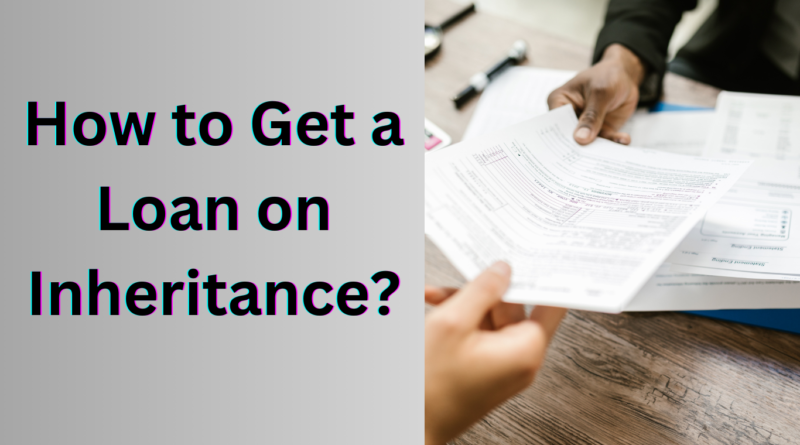How to Get a Loan on Inheritance?
When it comes to receiving an inheritance, the wait can often be long and tedious, filled with legal and administrative hurdles. For those who need access to their inheritance quickly, options such as inheritance loans and inheritance advances can provide a solution. This article will explore these options in detail, helping you understand their benefits, drawbacks, and processes.
Table of Contents
What Is an Inheritance Loan?
An inheritance loan, sometimes called an estate loan or probate advance loan, involves borrowing against your inheritance. Unlike a traditional loan, an inheritance loan is based on the value of the estate you are set to inherit from. The lender evaluates the estate, determines your potential inheritance, and offers a loan amount based on that assessment.
Benefits of an Inheritance Loan
Quick Access to Funds:
An inheritance loan can provide you with immediate access to a portion of your inheritance, allowing you to cover urgent expenses such as funeral costs, debts, or mortgage payments.
Financial Relief:
During a stressful time, financial relief can be invaluable, helping you focus on grieving and managing other aspects of your loved one’s estate.
Disadvantages of an Inheritance Loan
- Involvement of Lender in Probate:
The lender becomes involved in the probate process, which can extend the time and potentially cause conflicts within the family.
- High Interest Rates:
Inheritance loans often come with high interest rates, which can significantly reduce the amount of money you ultimately receive from the estate.
- Risk of Predatory Lenders:
The probate lending market is largely unregulated, making it a breeding ground for predatory practices. It is crucial to carefully review the terms and understand what you are agreeing to.
What Is an Inheritance Advance?
An inheritance advance, also known as an inheritance cash advance, estate advance, or probate advance, allows you to receive a portion of your inheritance without taking out a loan. Instead of repaying with interest, you sell a portion of your inheritance to the advance company. The estate pays the company directly at the end of the probate process.
How Much Will I Need to Pay for an Inheritance Advance?
The cost of an inheritance advance depends on several factors, including the size of the advance, the complexity of the estate, and the time until the estate is closed. Generally, the company takes a fixed amount from your share of the inheritance, which is agreed upon before the advance is given.
Do I Qualify to Receive an Inheritance Cash Advance?
To qualify for an inheritance cash advance, you typically need to have an inheritance of at least $10,000 from a U.S. probate estate. Credit issues such as bankruptcy or delinquencies usually do not disqualify you from receiving an advance.
How Much Will I Receive in My Inheritance Cash Advance?
Inheritance cash advances typically range between $5,000 and $350,000. Generally, the advance amount is no more than 40% of your expected inheritance. The exact amount will depend on the estate’s valuation and the advance company’s assessment.
Are There Fees or Risks With an Inheritance Advance?
There are usually no fees associated with applying for an inheritance advance. However, the main risk is that you are selling a portion of your inheritance, which means you will receive less money in the end. It’s important to ensure that all information provided to the advance company is accurate to avoid any complications.
Probate Loans vs Inheritance Loans
Probate loans are similar to inheritance loans as they both use the expected inheritance as collateral. However, probate loans may offer more competitive terms and rates, depending on the lender.
What Is Probate?
Probate is the legal process of validating a will and administering the deceased’s estate. This process includes appointing an executor, valuing the estate, paying debts and taxes, and distributing the remaining assets to beneficiaries.
What Is a Probate Loan?
A probate loan uses your inheritance as collateral to provide immediate funds. This type of loan can be useful for covering estate expenses or obtaining a portion of your inheritance quickly.
What Is the Probate Process?
The probate process generally involves the following steps:
- Filing a Petition for Probate:
Submitting the petition and the original will to the probate court.
- Probate Hearing:
A court hearing to admit the will to probate and appoint the executor.
- Settlements, Notifications, and Filings:
Valuing the estate, notifying relevant parties, settling disputes, and paying debts and taxes.
- Distribution of Assets:
The executor distributes the remaining assets to the heirs and closes the estate.
Can I Get a Loan to Pay Inheritance Tax?
Whether or not you need to pay inheritance tax depends on the state where the estate is located. Some states impose an inheritance tax, which you must pay out of pocket. In such cases, you might consider obtaining a loan to cover these taxes.
States with Inheritance Tax
- Pennsylvania
- New Jersey
- Maryland
- Kentucky
- Nebraska
- Iowa
How to Pay Inheritance Tax
Inheritance tax is paid out of your pocket, and the amount depends on the value of the inheritance and your relationship to the deceased. Loans can help cover these costs if necessary.
Inheritance Loan vs. Advance
Advantages of an Inheritance Advance
– No Interest or Monthly Payments:
Unlike loans, advances don’t accrue interest and don’t require monthly payments.
– No Personal Liability:
If the estate doesn’t cover the advance amount, you’re not personally liable.
Drawbacks of an Inheritance Advance
– Reduced Inheritance:
You will receive less money overall since you are selling a portion of your inheritance.
Advantages of an Inheritance Loan
– Quick Funds:
Provides immediate financial relief.
– Use of Inheritance as Collateral:
Uses your expected inheritance to secure the loan.
Drawbacks of an Inheritance Loan
– Interest and Fees:
Can be costly due to high-interest rates and fees.
– Involvement in Probate:
Lender involvement can complicate and extend the probate process.
Conclusion
Choosing between an inheritance loan and an inheritance advance depends on your immediate financial needs and long-term considerations. While both options provide quick access to funds, they come with their own sets of advantages and drawbacks. It’s essential to weigh these carefully and consult with a financial advisor to determine the best course of action.
FAQs
1. What is the main difference between an inheritance loan and an inheritance advance?
An inheritance loan requires repayment with interest, while an inheritance advance involves selling a portion of your inheritance with no interest or monthly payments.
2. How quickly can I get my inheritance money with a loan or advance?
Both options can provide funds within days of approval, depending on the lender or advance company.
3. Are there any risks involved with taking an inheritance loan?
Yes, inheritance loans come with high-interest rates and the risk of predatory lending practices. It’s crucial to review terms carefully.
4. Can I get an inheritance advance with bad credit?
Yes, credit issues typically do not disqualify you from receiving an inheritance advance.
5. What should I consider before choosing an inheritance loan or advance?
Consider the costs, fees, and potential impact on your inheritance, as well as your immediate financial needs and long-term goals.

